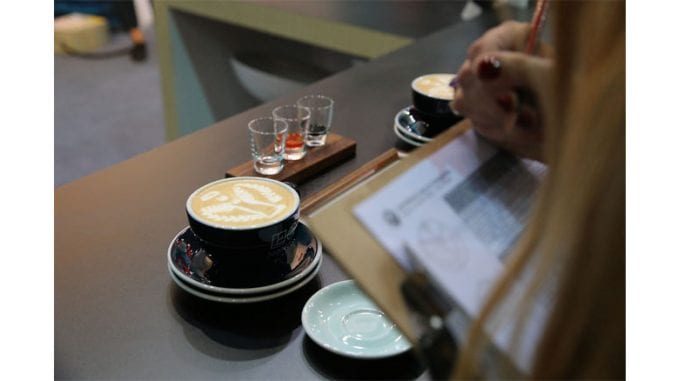
Rule changes for the 2017 World Coffee Events competitions have just been released. See how the rule changes could affect your competition prep.
BY ASHLEY RODRIGUEZ
BARISTA MAGAZINE
Photos courtesy of World Coffee Events.
On Wednesday, the World Coffee Events organization (WCE) released a series of rule changes for the 2017 competition schedule. The rule changes will affect all the competitions taking place at the World of Coffee Budapest event, hosted by the Speciality Coffee Association of Europe (SCAE) in June 13–15, 2017 (the only competition that will not take place at this event is the World Barista Championship, which will be held in South Korea November 9–12, 2017 at Cafe Show Seoul).
Although there are a number of important changes, rule modifications aren’t uncommon and in these specific circumstances, are not hugely consequential to the way the competitions will play out for the competitors. “Updating Rules & Regulations is something we do every year, and is a process driven by our Rules & Regulations Working Group, made up of judges, past competitors, and all sorts experts on competitions and global coffee,” shares Alex Bernson, Marketing Manager for World Coffee Events. The rule changes are meant to address issues that have come up in past competitions, and have been developed to assure fairness for all participants.

A complete breakdown of the rule changes can be found here, and as mentioned, most are fairly minor. There are some major changes, however, that will affect how competitors prepare for and present their drinks. World Brewers Cup competitors, for example, are now able to give their judges evaluative instructions and override the protocols of the scoresheet “to allow for more creativity in service and better standardize judging,” according to the WCE website. The change was inspired by the rules of the WBC, where competitors can give instructions during each round of coffee service regarding how they want the judges to enjoy their drinks. Also new to the World Brewers Cup event: the coffees competitors are required to use in the compulsory round is now required to be free of any defects.

The rule changes are not only a response to competitor concerns, says Alex, but also the growing number of participants. The World Latte Art Championship is creating a whole new semifinal round to accommodate the increased number of participating countries this contest has attracted. The semifinal round will focus on free-poured latte art, which is meant to “better recognize the diverse array of technical and aesthetic skills involved in the competition.”

The World Cup Tasters and World Coffee In Good Spirits championships also have a few rule tweaks, all of which aim to improve the quality of life for competitors—such as the requirement that competitors now must use a sponsored grinder for CIGS. This means that those without the means to bring their own aren’t at a disadvantage. A number of the rule changes were inspired by the history of rules—and changes—for the World Barista Championship, and aim to deliver an equal playing field for competitors.
A full list of all the rule changes can be found at the World Coffee Events website.

